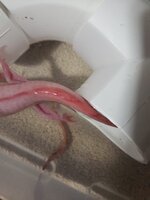either way, he needs to see a vet. wether it be ammonia burn or septicemia, both are serious illnesses that can and will cause death in axolotls.
* apologies for the terrible organization and formatting, i wrote this as quickly as i could
two options
this seems to be
either
1) a nasty case of ammonia burn (not to say there are good cases of ammonia burn, but i digress)
a few questions and a bit of advice related to that;
- what are you using to test your water?
- please list your parameters as well

- i would tub with cold, dechlorinated water, and change it 100% every day.
- he also sounds like he may have a fungal infection going on, which is also unfortunate - to both soothe the burned skin and treat the fungus, i recommend tea baths or IAL as treatment.
now to the more grim side of things.
2. its entirely possible this is a case of septicemia. i’m not a veterinarian by any means but i equally suspect septicemia and ammonia burn. it’s anyone’s guess as to which it might be, but considering you said your parameters were all fine, i fear septicemia and thought i’d give my advice;
- veterinarian, immediately. if it’s septicemia, there is no “at home” or “do it yourself” treatment. he needs professional treatment with antibiotics and possibly steroids.
and lastly, a final word of advice, more of an emotional kind
- prepare your son for the worst. either way, there is a chance this animal is going to die. even with immediate vet attention, there isn’t a lot of hope for septicemia.
however, this does not mean the animal is not entitled to treatment. let your son know, please. don’t pull the “they swam away” thing- its damaging to the child in the long run when they find out you lied to them (not saying you’d do this, but thought i’d make the point)
-
do not blame yourself. sometimes things happen, and animals get sick. unless you’ve neglected or intentionally harmed the animal, (which i dont believe you have, as you wouldn’t have posted if you didn’t care for the animals well-being) you are not to blame at all.
once again, apologies for the rambling and unorganized format,
i sincerely hope your little one gets better and beats whatever this may be
sent with love,
-ren



